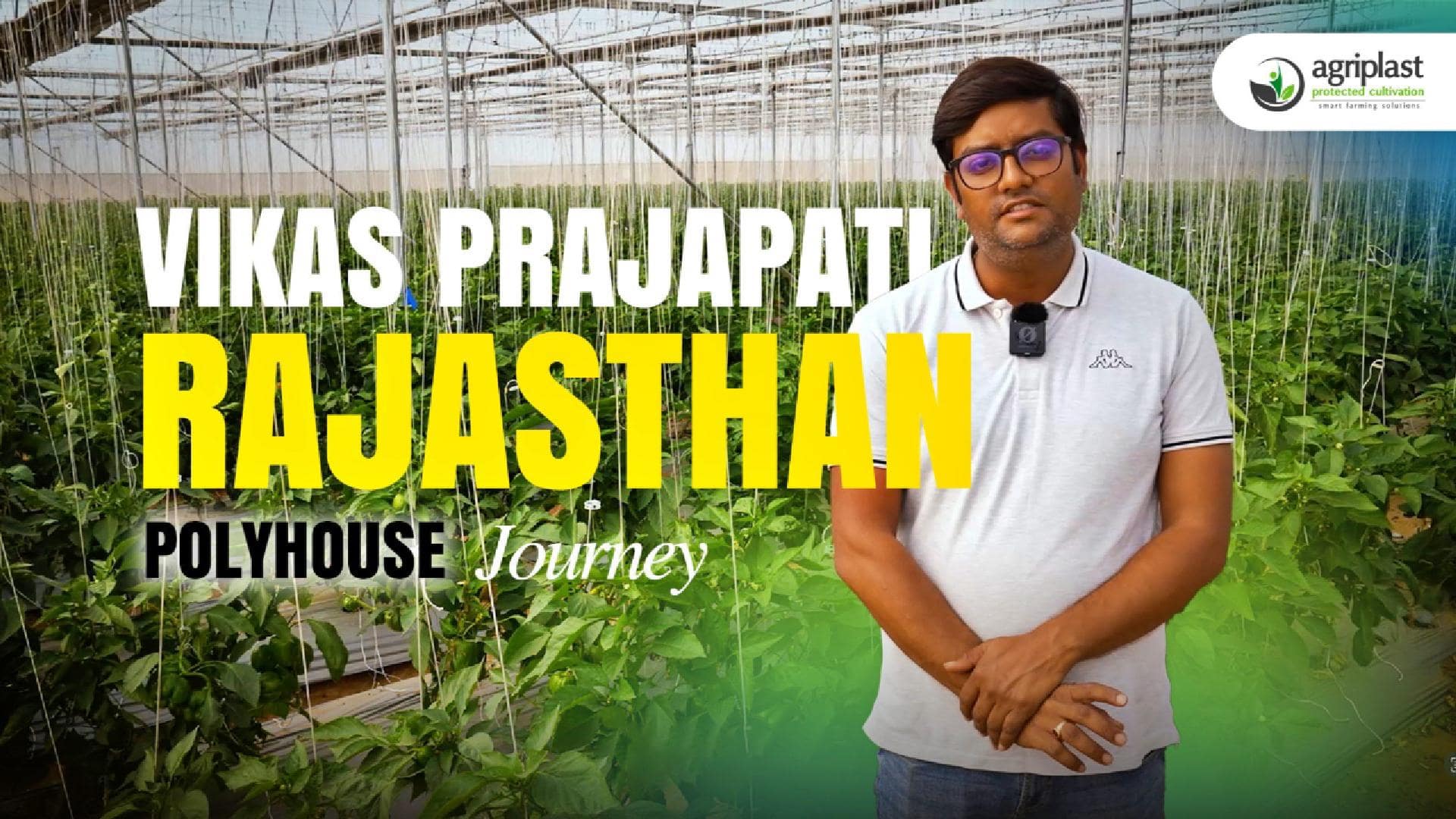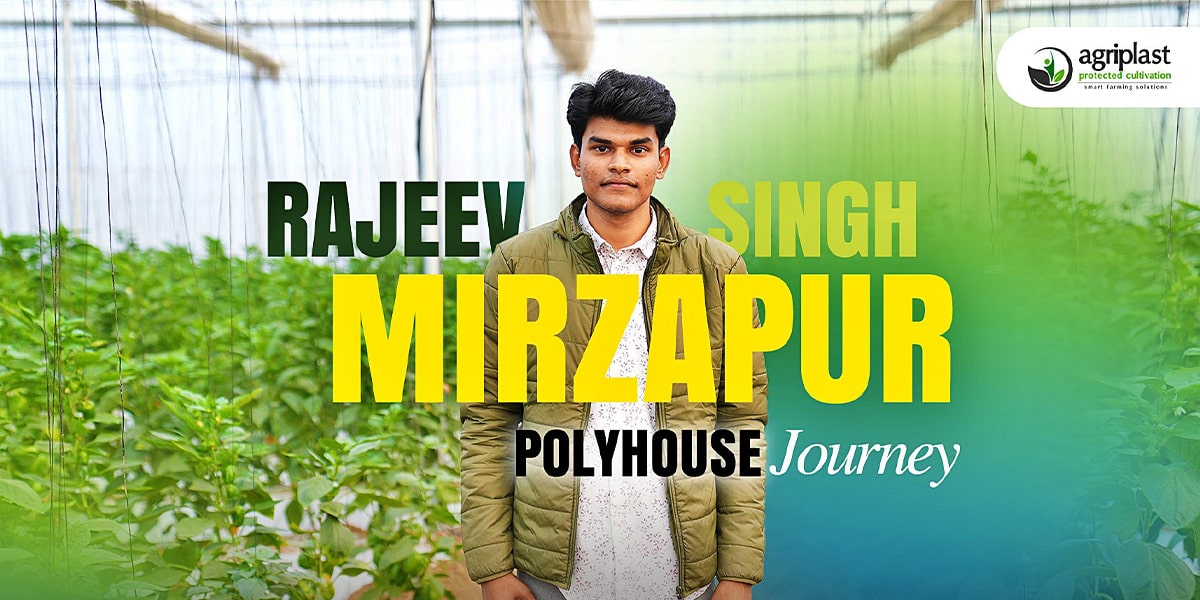The Role of Innovation in Modernizing Indian Agriculture with Polyhouses
In a country where agriculture is not just a profession but a way of life for a significant portion of the population, innovation is crucial for survival and progress. As one of the most populous nations on earth with ever-growing food requirements, India needs to continually evolve its agricultural practices. The use of sophisticated cultivation techniques, such as polyhouses, has emerged as one of the most promising approaches to coping with these demands, offering an opportunity to rewrite the Indian agriculture story. In this post, we will delve into how polyhouse technology is revolutionizing Indian agriculture and how Agriplast Protected Cultivation, as the country's largest greenhouse factory, is making this innovation accessible to all farmers across the country.

Polyhouse farming is a cost-effective and resource-efficient way of cultivating crops that yields superior results compared to traditional farming methods. It allows the creation of a controlled environment that provides year-round favorable conditions for a variety of crops. The polyhouse, a specially designed fabric-covered house-like structure, helps to control temperature, humidity, and light, thereby optimizing conditions for crop growth.
Besides offering perfect growing conditions, polyhouse farming also increases yield, enhances crop quality, and reduces the risk of pests and diseases. This has a direct impact on the income and profitability of farmers, making it a highly appealing option for those in the agricultural sector.
As India's leading polyhouse manufacturer, Agriplast Protected Cultivation is spearheading the movement of modernizing Indian agriculture through its state-of-the-art products and services. Their team of experienced professionals is dedicated to providing effective solutions to farmers' concerns, along with the necessary support to make the transition to polyhouse farming a smooth one.
In a country where food security is a prominent issue, polyhouse farming has the potential to be a game-changer, ensuring higher and more stable crop yields. Consequentially, it will bring a paradigm shift in Indian agriculture, securing the livelihoods of farmers and paving the way for a sustainable agricultural economy. With supporting players like Agriplast Protected Cultivation leading the charge, the future of Indian agriculture looks promising. Join us as we delve deeper into the world of polyhouse farming and its transformative impact on Indian agriculture.
The Role of Innovation in Modernizing Indian Agriculture with Polyhouses
As India faces mounting pressure to sustainably feed its rapidly growing population, innovation is more important than ever to ensure long-term food security and agricultural prosperity. Polyhouses represent one such innovative solution that holds the potential to transform the way Indian farmers cultivate their crops. In this guide, we'll explore how polyhouses are revolutionizing Indian agriculture and discuss how Agriplast Protected Cultivation, India's leading polyhouse manufacturer, is easing the transition for farmers seeking to adopt this cutting-edge farming method.
Understanding the Polyhouse: A Unique Farming Solution
1. The Fundamentals of Polyhouse Structures
Polyhouses, also known as plastic greenhouses, are constructed using a sturdy metal frame covered with a translucent plastic sheet, typically polyethylene, which allows sunlight to penetrate while protecting the crops from adverse weather conditions. They create a controlled environment within the structure, enabling farmers to regulate temperature, humidity, and other critical factors that impact plant growth.
2. Wide Range of Applications
Polyhouse farming is suitable for a broad spectrum of crops, including vegetables, flowers, and even exotic plants that require specific microclimates to thrive. As a result, farmers can expand their offerings and tap into niche markets, serving customers who demand high-quality, locally-sourced food all year round.
Increasing Productivity and Profitability
1. Higher Crop Yields
Polyhouse farming can significantly increase crop yields, as the controlled environment promotes optimal conditions for growth. The ability to grow crops continuously throughout the year further boosts overall yields, as farmers can produce multiple harvests regardless of the season.
2. Enhanced Crop Quality
Protected cultivation methods result in healthier plants and higher-quality produce, free from the damage caused by external factors such as pests, diseases, and extreme weather. Consumers increasingly value the quality and taste of produce, so delivering exceptional products can directly impact a farmer's marketability and revenues.
Sustainable Farming Practices for a Greener Future
1. Reduced Pesticide and Fertilizer Use
Polyhouses create an environment that is less hospitable to pests and diseases, reducing the need for harmful pesticides and fertilizers. This not only lowers a farmer's production costs but also contributes to more environmentally-friendly agricultural practices, benefiting both the farmer's bottom line and the planet at large.
2. Efficient Water Management
Traditional open-field farming can lead to significant water waste. With a polyhouse, farmers can employ precision irrigation methods, such as drip irrigation, reducing the amount of water used while optimizing crop hydration. This enhanced water management translates to increased resource efficiency for India's typically water-scarce agricultural regions.
Agriplast Protected Cultivation's Role in the Polyhouse Revolution
1. Customized Solutions Tailored to Indian Farmers
As India's largest greenhouse factory, Agriplast Protected Cultivation offers customized polyhouse solutions designed specifically for the Indian agricultural landscape. The company's experienced professionals work closely with farmers to assess their individual needs and recommend the most suitable polyhouse designs based on their unique circumstances.
2. Comprehensive Support and Training Services
Transitioning to polyhouse farming can be a daunting experience for farmers accustomed to conventional methods. To facilitate this change, Agriplast Protected Cultivation provides comprehensive support services, from installation and maintenance to ongoing training and guidance. This holistic approach ensures that Indian farmers are fully equipped to embrace the potential of polyhouse farming and maximize the benefits it offers.
3. Driving the Polyhouse Movement Across India
Agriplast Protected Cultivation is committed to making polyhouse technology accessible to Indian farmers of all sizes, from small-scale family operations to large commercial agricultural enterprises. By providing affordable options and financing assistance, the company is advancing the polyhouse movement and helping Indian farmers adopt innovative and productive farming practices.
Conclusion
As India grapples with the need to modernize its agricultural sector in the face of increasing food demand and limited resources, polyhouse technology offers an attractive and sustainable solution that can revolutionize the country's farming practices. Achieving higher crop yields, enhanced quality, and more eco-friendly cultivation methods are within reach with the help of providers like Agriplast Protected Cultivation, who are championing the benefits of polyhouses and arming Indian farmers with the knowledge and capabilities to embrace this transformative approach.
By adopting polyhouses, Indian farmers can successfully navigate the challenges presented by a rapidly changing agricultural landscape and build a prosperous, sustainable future for themselves and their communities. Agriplast Protected Cultivation's unwavering commitment to facilitating this transition is instrumental in advancing the polyhouse revolution, working to ensure that Indian agriculture not only survives but thrives in the face of evolving demands and constraints.




















